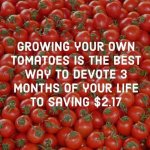Why are we living longer if the corporations are poisoning us?
Corporations are rigid dictatorships.
All decisions are made at the top.
There's some truth in this. But there is a place for "dictatorship" and top-down, for some decision-making.
The people at the top of these processed food corporations deliberately have decided to poison the food supply. For profit.
But then why is our food supply today the healthiest it has ever been? The food safety laws have helped, but the industry controls most of this and also controls those who enforce the laws. With some increases of the regulations playing a role, the profit-making food industry makes it possible for intelligent consumers, including the poor, to eat healthier than ever before. Isn't this part of what has increased the life expectancy to the highest it's ever been?
But if the food industry has been poisoning us, then our life expectancy should be decreasing, not increasing.
(The recent small decline in U.S. life expectancy is clearly due to individual bad behavior factors and not to any food poisoning.)
The next generation will be filled with obesity and diabetes because of the choices of the scum you defend.
90% of that problem would be solved by a general
sugar tax on all food products. Perhaps 5% by a sodium tax. Just a small tweak to the system, and the profit-making food industry overall is making us healthier and increasing our life span.
The labeling laws, about ingredients etc., can be improved. Overall the industry deserves a B or B+. WalMart is getting better at offering some good choices at low prices. It's not their fault that so many poor people still demand the junk. Corporate America's main function is to give us what we want, not to look after our personal health by withholding bad stuff from us. The choices are there for those who choose what's healthy and those who choose junk.
Poor people can get to a WalMart and other good sources if they choose to make the effort, no matter where they live.
Is "
Ensure" (nutrition drink) a healthy product? At Gitmo they force-fed the prisoners with
Ensure, so it seems the Federal Government is endorsing this product as healthy. (Or is it poison, and they were really trying to KILL those prisoners with it?)
It contains all the recommended vitamins and minerals, but not mega-doses like most of the supplements.
Meanwhile, WalMart offers an
Ensure copycat product at lower cost. I noticed a slight reduction in the sugar content in this product, a year or 2 ago. So it seems the industry slowly moves in the right direction. Overall Corporate America slowly improves what it serves up to consumers, or at least to those who make intelligent choices.
Another meanwhile, Kroger offers a low-priced
yogurt product with low sugar. So a poor person can get yogurt, which is healthy, and without the extra sugar in most yogurt products.
Though it contains
sucralose (splenda) artificial sweetener. But isn't this sweetener OK (contrary to the earlier artificial sweeteners)?
(Don't most poor people live close enough to a Ralph's or Food-4-Less? Can't they get on a bus? What's their problem?)
And what about "
Whole Wheat" Bread? Is this healthier? It's not too expensive. The cost of "100% whole wheat bread" has decreased a bit in recent years, rather than increased. And they've mostly eliminated the "
hydrogenated oil" and "
high-fructose corn syrup." So, isn't this going in the right direction, even for the poor (if they just make the right choice)? The real problem is that they just don't give a damn. ("You can lead a horse to water, but . . . etc.)
Or are all wheat products really "poison" and slowly killing us? If so, then they're killing the rich just as much as the poor.

